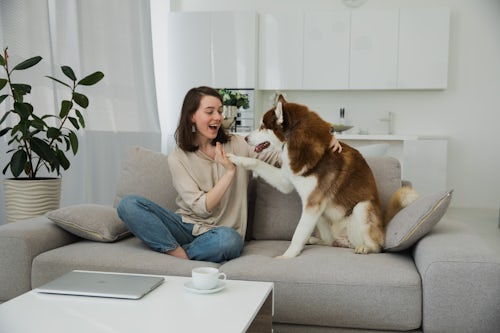Why should you walk your dog?
We all know that it’s important for our dogs to get regular exercise. In fact, many of us get a dog to encourage us to get out and exercise more frequently. But busy lives, bad weather and work pressures sometimes mean that even the most responsible dog owners can find it tricky to consistently fit dog walks into their daily routine.
Some dog owners report that their dog seems to have boundless energy and follows them round the house with its lead in its mouth, trying to get out for that daily walk. However, many other owners say that their dog needs as much - if not more - encouragement to get out and exercise as they do. In this situation, it can be harder than ever to find the motivation to go for that all-important dog walk.
Many exercise motivation blogs for us humans talk about the importance of buddying up for workouts to make them more enjoyable and our dogs probably feel the same way about their exercise time too. Going for a walk isn't just about blowing away the cobwebs and chasing the occasional squirrel; it's about spending time with you, their owner.
Dedicating regular periods of time to go for a walk does more than burn calories and keep both us and our dogs in shape. It helps to deepen the bond between owner and dog, and it dispels the doggy boredom and anxiety that can lead to bad behaviour such as chewing or digging.
In a recent survey of dog owners conducted by Biscuit Pet Care we discovered that walkies time is just as beneficial for owners' mental and physical health as it is for dogs:
- 85% of owners feel more positive after walking their dog
- 82% feel a stronger bond with their dog after a walk
- 89% feel a physical benefit after walking their dog
Here are just a few benefits of walking that both you and your dog can enjoy:
1. Stay fit & healthy
Walking has positive impacts on the physical health of both you and your dog. Walking with or without a canine companion has a whole host of benefits, including the prevention or management of various conditions, such as heart disease, stroke, high blood pressure, cancer and type 2 diabetes. It also improves cardiovascular fitness, strengthens bones and muscles and boosts your immune system.
Studies have shown that having a 4-legged personal trainer on hand to encourage you out of the door for that health-boosting walk can make you live longer than people who do not own a dog. This is because dog ownership encourages people to get outside to exercise and socialise. Having a dog has also been linked to an increased ability to manage loneliness and depression.

A BMC Public Health survey found that dog owners walk for 22 minutes more per day than people who do not own a dog. Taking the dog out also encourages people to walk slightly faster than average, as dogs tend to walk more quickly than humans. This means that it is particularly useful for older people to own dogs, as walking at a moderate cadence is a recommended daily exercise for most people in this age group.
A recent study published by nature.com linked owning a dog to losing weight, finding that people who walk their dogs are more likely to meet their daily physical activity goals. On average, dog owners walk 160 minutes more per week and reach their activity targets 87% of the time, as opposed to non-owners who met their targets only 63% of the time.
Regular walking can help reduce obesity in your dog too, as it’s a great way for them to burn those excess calories. Many dogs need to be walked at least once each day and very active ones, such as retrievers, collies and springer spaniels, may require more. The number of minutes of exercise your dog requires per day will be dictated by a number of factors including their age, personality, breed and overall health. If in doubt, speak to your vet.
But it's not just about looking trim. If a dog is cooped inside all day, it can affect its mental health and lead to behavioural issues. Giving your dog the opportunity to explore new sights and smells staves off the boredom that can lead to unwanted behaviours. It also helps them to combat fear, anxiety and stress. In addition, exposing your dog to new sights, sounds and environments in a controlled way also help them cope with new situations they might come across in the future.
Regular exercise also helps with maintaining joint health. Both human and canine joints can get stiff if they are not used frequently enough and staying active will help improve the ease and range of motion and reduce the likelihood of joint-related health issues.
Finally, establishing a regular routine for trips outdoors allows your dog to predict potty breaks, which reduces accidents and the risk of bladder infections and constipation and helps to regulate the digestive tract.
2. Get a Better Night's Sleep

Humans need 7- 8 hours sleep a night and dogs need 12 - 14 hours of sleep per day. Walking tires both dog and owner out physically, but it also exercises the mind. Exploring new paths and seeing other people with their pets are great mental stimulation for you and your dog. For owners, having a bit of time down time away from a screen can help us to process problems and come up with new ideas (which is a great alternative to lying awake thinking about them in the middle of the night!). A good dog walk will burn off excess energy and clear the mind, helping both human and dog to sleep better.
3. Boost emotional health
Our dogs are a source of love, loyalty and companionship that can have a hugely positive impact on our mental health. Just by being around, they can reduce stress, anxiety, loneliness and depression. By relying on us for food, affection and exercise they can provide life with a purpose on even the darkest day.
A dog's need for frequent walks also boosts physical and emotional wellbeing in its owner and there are recognised mental health benefits associated with being outside in green space.
Even if your dog isn't the most sociable pooch around, going for a dog walk can increase social interaction. Other dog owners will often talk to a fellow owner, as you obviously share a common interest and, if you suffer from anxiety or lack confidence, having a dog by your side may help to reduce the discomfort of these social interactions.
Regular walks can also alleviate any emotional or behavioural issues your dog may be suffering from. Many of the things that dogs do that we humans find annoying - such as excessive barking, destructive behaviour and constant attention-seeking - stem from boredom, anxiety, stress or loneliness. Walking regularly with your dog helps to build trust with them and improves their behavioural development, which in turn helps them to interact with society more successfully.
4. Making New Friends and Managing Behaviour

Dog walking is a great opportunity to socialise, for both you and your dog. It can help you start and maintain new friendships with other dog owners, as you often end up stopping and talking to each other on walks and hikes or in the park.
It's important for your dog to interact with other people and dogs and explore new environments too. Meeting new friends on a regular basis in a controlled manner (such as on a lead during a walk) can help with on-going behaviour management. Walks also provide the opportunity to practice lots of the things that you both learnt in dog training classes, as there will be plenty of times when a dog’s obedience training is called into action!
5. Stress relief
Walking your dog can help reduce your overall stress levels. While your dog is connecting with nature, so are you. If you step away from the screens in your life, soak up the scenery and enjoy the fresh air you can increase your focus and well-being. If you are tying yourself in knots with a work conundrum or wondering how to resolve a life crisis, you will be surprised by how many brainwaves hit while you are stomping the trails or wandering around the park with your dog.
In addition, touching your dog and playing games with them is a cheap, easy and healthy way to manage stress. By stroking your dog or playing a game such as fetch or catch with them, you can lower blood pressure and quickly feel calmer and less stressed.
Let's be honest, dogs are pretty funny. Actor Bill Nighy, renowned for his own comedic stylings, was once asked what he himself found funny and his answer was dogs. They encourage us to be more light-hearted and playful, which can boost our energy levels and bust our stress levels. When you think of how much you feed them, it's not really cheap therapy, but it is more enjoyable than sitting in a stuffy waiting room lined with qualification certificates.
6. Dogs are incredible motivators

Your dog can be a great motivator to get you outdoors regularly, as they create a feeling of responsibility and accountability for their health & wellbeing. On days when the weather is bad, your zest for life is at a low ebb and your sofa seems like the most attractive place in the world, your dog still needs your participation to get their daily exercise. So peel yourself off the couch, put on your coat and wellies and head out to spend some quality time with your bestie. You will both appreciate it, especially when you are both snuggled up on the sofa again and enjoying the feeling of smugness that comes with having made the effort to get out and walk.
5 Tips for walking with your dog
- Supervise your dog around other dogs, strangers and children - as calm and gentle as they may seem at home, you do not know how they will react in unfamiliar situations, so it is always best to be on your guard.
- Clean up after your dog - pop a roll of poop bags in all the coats that you regularly use for dog walking, so that they are to hand after your dog's inevitable mid-walk bathroom break.
- Plan your walks according to the weather and time of day - During the winter, both you and your dog will benefit from getting out in the middle of the day, when temperatures are usually warmest and the daylight will boost your mood and make it easier to see where you are going. On warm summer days, take your walks in the early morning or the evening, when the lower temperature is safer for your dog.
- Stay hydrated during your walks - Carry a bottle of fresh water and a collapsible dog drinking bowl, so that both you and your dog can pause mid-walk for a refreshing drink or two.
- Not sure how long to walk your dog? Download the Biscuit app to see our recommendation for your dog and to start earning rewards for walking your dog (as if all the benefits listed here weren't enough :-))

.png?ixlib=gatsbyFP&auto=compress%2Cformat&fit=max&w=70&h=70)